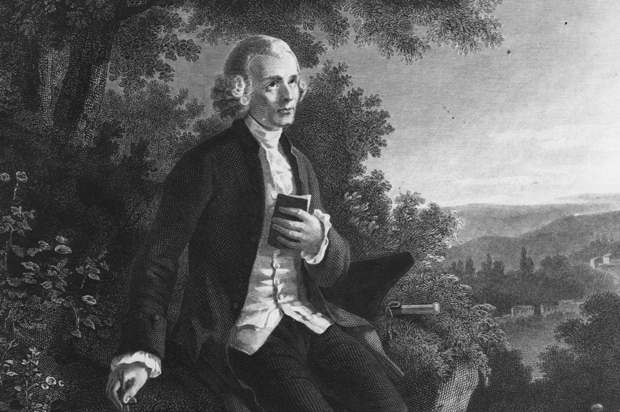The flour is what matters, and not the mill, Georg Christoph Lichtenberg wrote in his notebook in 1799. ‘When we ask what time it is, we don’t want to know how watches are constructed.’
A telling assertion, considering Lichtenberg’s place and time. For nearly two centuries, the ‘mechanical philosophy’ had ground down tradition and metaphysics into reason and material processes. Enlightenment metaphors were mechanical: God as the divine watchmaker; or, in Leibniz’s image, the Cartesian mind and body as two clocks, synchronised but separate. As an experimental physicist, Lichtenberg practised the Enlightenment method, experiment and induction. But his frustration with matter and reason was Romantic. He was ready, in Anthony Gottlieb’s formulation, for the rest of modern philosophy, beginning with the deep-diving, muddy Germans.
As are we, after reading The Dream of Enlightenment. Gottlieb’s survey of
philosophy from the Greeks to the Renaissance, The Dream of Reason (2000), has been acclaimed as a modern classic. Its sequel, an expert account of mechanical scepticism and political theory from Descartes to Voltaire, is the lucid central panel of a triptych. If Gottlieb can pull off his final volume, he will surely supplant Bertrand Russell as the under- graduate’s guide.
Gottlieb frames each thinker in his historical context. Hobbes hedges his bets after the English Civil War, Spinoza reacts against the newly observant Sephardim of Amsterdam, and Rousseau cannot stand anyone else. Their potted biographies are limned in sharp lines, but the primary colours of personal eccentricity are balanced with the secondary and tertiary complexities of intellectual life. Descartes solicits Hobbes’s comments on Meditations, then ridicules his correspondent. Hobbes and Spinoza share cryptic similarities on the possibility of miracles and the nature of God. Hume hides his contempt for priestly doctrine beneath a veil of Georgian manners, and covets the afterlife, not of the soul but of intellectual immortality. Leibniz the polymath pokes holes in Locke’s Essay Concerning Human Understanding, plans the reunification of the churches, and designs a calculating machine — only to suffer posthumous deflation in Candide by Voltaire, who is more of a polemicist than a philosopher.
Kant, one of the few Enlightenment philosophers to teach in a university, simplified the history of philosophy into a team sport: the empiricists (Aristotle and Locke) versus the rationalists (Plato and Liebniz). The lines are not so clear in life, and Gottlieb, a former editor of the Economist, is tough on his students. Stephen Pinker is marked down for unfounded generalisation about Hobbes, Rousseau, and the ‘state of nature’. Prince Charles wears the dunce’s hat for attributing environmental degradation to Descartes’s mind-body split. Bertrand Russell and Isaiah Berlin are reprimanded for linking Rousseau’s defence of coercion to 20th-century totalitarianism.
Truth, Leibniz wrote, ‘is more widespread than people think’; but we, Gottlieb shows, remember what we can use. Descartes was less possessed by problems of mind and knowledge than mathematics. Hobbes’s horror stories of war and anarchy were warnings, evidence for his argument that people need peace, ‘whether they realise it or not’. The philosophes shared a trust in new thinking, but could not agree on a political programme; Voltaire,
Gottlieb writes, ‘could not agree on such a programme even with himself’.
We remember Thomas Jefferson’s praise of Locke, the philosophical precursor to the American constitution. But in his lifetime, Locke was a philosopher of knowledge, not tolerance or revolution. He also had been ‘something of a political Hobbist in his youth’. Gottlieb detects a nasty, brutish and long streak of Hobbesian solutions in Locke’s thought. In 1661, Locke wrote that ‘a general freedom is but a general bondage’; in 1669, he wrote a feudal constitution for colonial Carolina; in 1697, seven years after the Essay Concerning Human Understanding, he proposed cruel controls and punishments for unemployed workers in England.
Gottlieb also shuns the other team sport of the period: the game of the Enlightenment versus the Counter-Enlightenment, with rules codified by Isaiah Berlin, and Rousseau playing for both sides. As for whether mechanical philosophy and universal rationalism sowed the seeds of totalitarianism, Gottlieb cites the philosophers of the Judean People’s Front: ‘What has the Enlightenment done for us?’
The Dream of Enlightenment is historically sensitive, intellectually subtle and an implicit argument for the culture of tolerance. How will Gottlieb follow the ‘rise of modern philosophy’? Will philosophy fall into Romantic irrationalism — or, like Marx’s bourgeois, will it rise and rise by Anglo-American systematising? Like the commentator on Monty Python’s philosophical soccer match, we anticipate the completion of Gottlieb’s trilogy. ‘And here come the Germans now, led by their skipper, “Nobby” Hegel…’







Comments